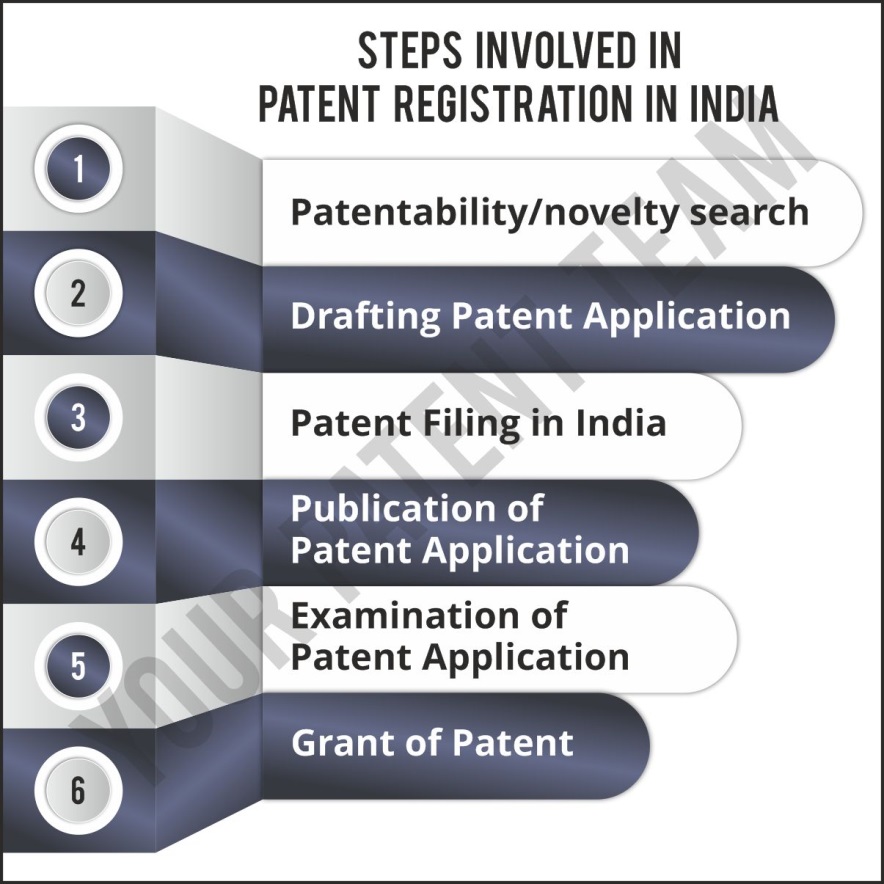India in the modern day is flourishing with ideas and inventions in a plethora of industries. More and more patents are being filed each day, making Patent Registration in India a very important task. It takes somewhere between 3 to 5 years to complete the patent registration in India. You may not get the grant for the patent if you fail to comply with the necessary processes. Therefore, it is of prime importance that one thoroughly understands all the steps. This includes all the important forms, formalities and deadlines i in the process. This helps to have a plain sailing patent registration.
Also, Read: Patent Fundamentals
Patent Registration in India: A 6 Step Guide

1. Patentability/novelty search
Before filing a patent application with the Indian Patent Office, a thorough patentability search should be done. The results of this search determine the chances of getting a patent based on the discovery of prior art. This should be done for both patent and non-patent references. You can conduct a patentability search on the IP India website.
A patentability search is highly advisable but it is not a mandatory step.
2. Drafting Patent Application
Once you get the results of the search, the next step is to draft the patent application (using form 1).
You must ensure that a patent specification accompanies your patent application (using form 2). Depending on the state of the invention, one can file a provisional or complete patent application. If the invention is still in development, then you should consider filing a provisional application. This blocks a priority date for the applicant. It also gives them a time of 12 months to see the invention to completion and file the complete application.
While filing the patent application, you must attach a patent draft to it. It is the patent’s representation in front of the patent office, so it is very important. The decision of granting the patent relies on this draft.
3. Patent Filing in India
Patent registration in India requires a list of forms. You can find them below along with their purpose:
- Patent grant application form – Form 1
- Specification form (complete/provisional) – Form 2
- Statement and undertaking form (Necessary if a corresponding patent application is filed in another country) – Form 3
- Inventorship declaration form (To be filed only along with the complete application) – Form 5
- Request for Examination – Form 18
- Patent agent authorization form (Necessary only if the applicant is using a patent agent) Form 26
- Form for start-ups or small entity (Necessary only if the applicant is claiming start-up or small entity status) – Form 28
4. Publication of Patent Application
The Indian Patent Office publishes every patent application one files with them in the official patent journal. This does not require any separate requests. Generally, the patent office publishes the application 18 months from the date of filing. However, if an applicant wants an early publication, then they can get it done within a month (using Form 9).
The patent office does not publish an application if:
The invention falls in a category of publication which could be against the interest of the nation.
The complete application is not filed within 12 months of the date of filing of the provisional application.
The applicant requests a withdrawal (3 months prior to the publication).
5. Examination of Patent Application
This is perhaps the hardest part of the patent registration process in India. The IPO scrutinizes every patent application before granting the patent. An applicant must request for an examination after their publication (using Form 18). The application is queued for the examination once the IPO receives the Request for Examination (RFE). An examiner in the relevant field examines the application to ensure the same is in accordance with the patent act and rules. The examiner also performs a search to understand similar technologies to ascertain if the invention would satisfy the patentability criteria.
On the basis of the review of the application, the examiner will issue the First Examination Report (FER) to the applicant. It states the grounds for objections to the grant of the patent. The applicant must successfully overcome all the objections in order to get a grant for the patent. The total time to respond to the FER is 6 months from the date on which the patent office issues the FER. However, the applicant can file a request for an extension (using Form 4) and get an extension of 3 months.
6. Grant of patent
The patent receives a grant once the applicant overcomes all the objections. The patent is valid for 20 years, and it needs a periodic renewal during those 20 years.
The First Schedule specifies the fees which are payable with respect to the grant of patents and applications.
Patent registration in India: Key Points
- A thorough patentability search is very important even though it is not mandatory.
- The patent draft is of cardinal importance. The decision of granting the patent relies on this draft.
- It is always better to get an early publication to avoid any possible competitions/infringements.
- Ensure that your office actions responses are within prescribed deadlines and you follow the necessary protocol.
Why choose our services?
Before you proceed with the patent registration process, you need to decide if you would need the assistance of a patent professional. Consider the steps and deadlines involved. It is highly advisable that you engage a patent professional / firm who has years of experience in the patent field. YPT is a team of 225+ technology/industry experts who speak the inventor’s language and have a deep understanding of Indian & Global Patent Laws.
YPT utilizes its knowledge in patent prosecution and patent enforcement to draft patent applications, ensuring maximum enforceability and cost-saving. We have an in-depth understanding of the working style of all 4 patent offices in India and also have a good network with them to ensure expedited and accurate information.
Visit us to avail Your Patent Team’s services.
Other Insights:
- How To File A Utility Patent? Explained In 6 Simple Steps
- IPR Issues of India: Challenges to be Aware of before Filing
Click Here to Get Download Access (All Free Resources)



